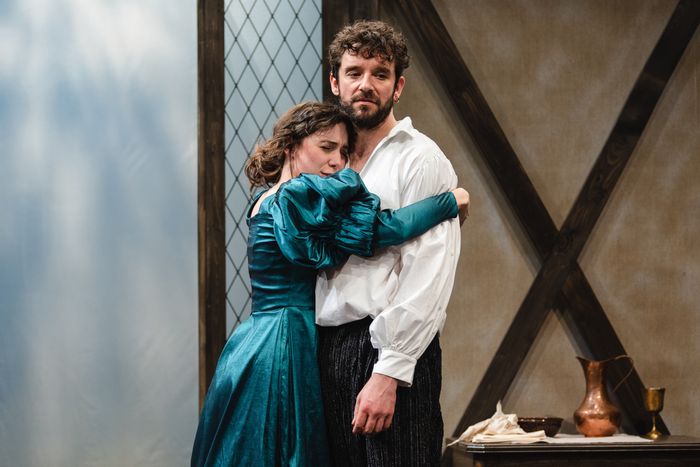
Nobody knows exactly who wrote the pamphlet “Jane Anger Her Protection for Women,” published in England in 1589. Was it really written by a woman named Jane Anger? Was it even written by a woman? It’s certainly tart as a thrown lemon, a defense against 16th-century querelle des femmes discourse, which grappled with questions of women’s virtue and sense. In her polemic, Anger exudes a lively contempt for male pamphleteers’ attacks: “For if Tom Foole will presume to ride on Alexander’s horse, he is not to be pitied though he get a foul knock,” she says about men who (incellishly) use misogynist rhetoric to disguise their sulks. Put those men right in the bin, she says; crown ’em with a chamber pot.
Playwright Talene Monahon hazards a guess about what such a woman might have been like in her vivid comedy Jane Anger, which, when the play uses her full maiden name, is: The Lamentable Comedie of JANE ANGER, that Cunning Woman, and also of Willy Shakefpeare and his Peasant Companion, Francis, Yes and Also of Anne Hathaway (also a Woman) Who Tried Very Hard. Monahon’s gallantly goofy play starts with anachronism and gets more aggressive about history from there. At first, Jane herself hops onstage to deliver some exposition. Monahon adjusts Jane’s publication date forward to 1606, so it comes right in the middle of an outbreak of London’s bubonic plague. Jane (Amelia Workman) informs us that contagion has driven the rich out of town, the poor have stayed behind in the city, and all the playhouses have closed. Rings a bell, doesn’t it?
Jane peddles plague medicines, so she’s welcome when she shinnies up a drainpipe and into the study of her old beau, William Shakespeare (Michael Urie). The quarantine police have nailed his front door shut, so Shakespeare and his career-obsessed servant, Francis (Ryan Spahn), are battling cabin fever and writer’s block together in one small apartment. Jane’s arrival throws a Dark Lady into the works — she is both a balm for the playwright’s erotic deprivation and, bewilderingly for the two men, a writer herself. She is hoping Shakespeare might help her get published, but Urie’s hilariously self-obsessed poet rolls his eyes at her and bats away her requests. He is so over everyone expecting him to have a productive quarantine. Why can’t people just say his new earring is cool and let him rest on his laurels? Ugh, fine, he’ll write King Lear as long as his annoying wife, Anne Hathaway (Monahon herself), doesn’t also shinny up the drainpipe to bother him.
Monahon has written deft plays before, including her clever comedy How to Load a Musket, and she flourishes here, her writing fleet and crisp and silly by turns. She does undertake various attacks on the theater’s obsession with Shakespeare and the limp modern discourse about women’s likability (pity all our Anne Hathaways!), but she makes these ripostes gently; the real Jane Anger was harsher. Still, director Jess Chayes has Workman portray Jane as a barely leashed threat, and Workman — always a chaotic, frightening beauty — obliges. Spahn does the trickiest lifting comedy-wise, both bearing up under Monahon’s few wrong-footed moments (a “Who’s on First?”–style routine about his character’s last name) and getting the biggest laugh of the night with some audience work. And Urie is, as always, a triumph. His Shakespeare consists of a deliberately limited set of ingredients — peevishness, sudden freak-outs, equally sudden flops into boneless ennui — which Urie assembles and reassembles into a banquet.
It’s obvious from their peppery chemistry that Monahon shaped Francis and Shakespeare for Spahn and Urie, who are a real-life couple. In fact, the project started as a 2020 digital MCC Labs two-hander for the pair, only growing later to include the two women. Jane Anger is the first in-person production of the team behind Play-PerView*, a pandemic-spurred online-play-reading platform. It is thus in the first generation of live shows born from the pandemic’s virtual initiatives — conceived online, gestated online, realized on a stage. This hybrid methodology explains how such a major piece with such a stacked cast popped up in March relatively under the radar. (Urie was on Broadway this fall and headlined a Netflix rom-com; now he’s making “ruff play” jokes at the microscopic Off-Off New Ohio Theater.)
As we return from the shutdown, the industry-as-usual’s flaws have revealed themselves again, particularly its maddening slowness at bringing shows to the stage. When you look at New York’s Off Broadway seasons, you mostly see theatrical machinery that has been grinding along for half a decade. Not Jane Anger, though. In this production, we have the equivalent of the polemicist’s pamphlet. Care and slowness have their place, but they are the death of topicality. If you have something to say, why wait for a whole long process? Instead, with a little will, you can get plays written and off the presses as soon as possible. Jane Anger practically steams in the cool March night — still hot with the impulse that made it.
Jane Anger is at the New Ohio Theatre through March 26.
*Correction, March 7: Play-PerView’s producer Jeremy Wein told me he has left the production, citing a dispute with a producer over back pay and future compensation.


